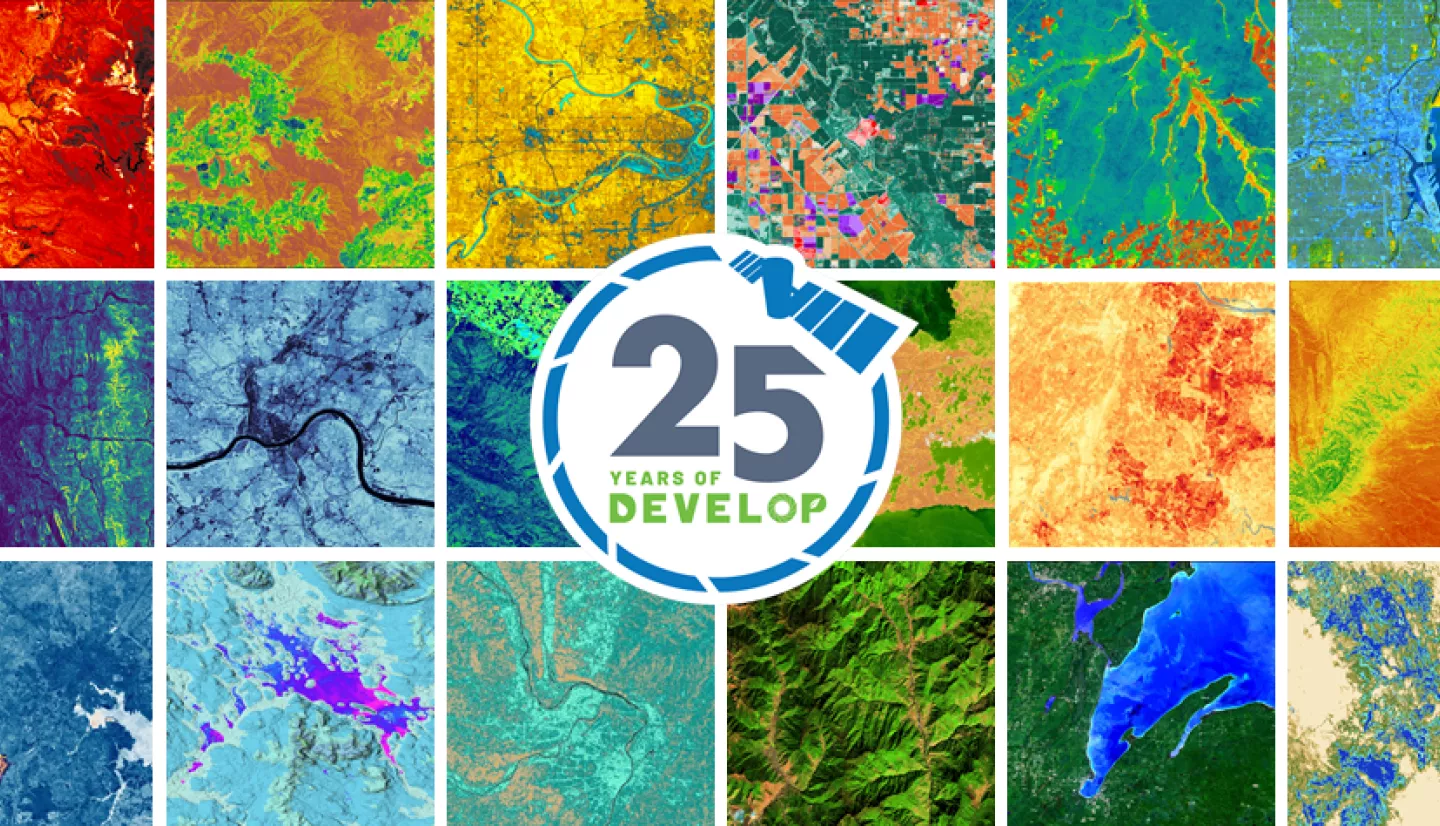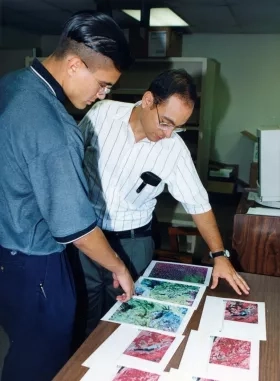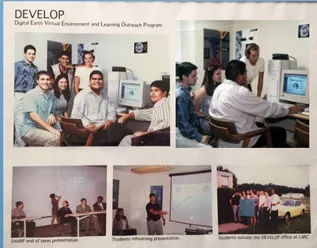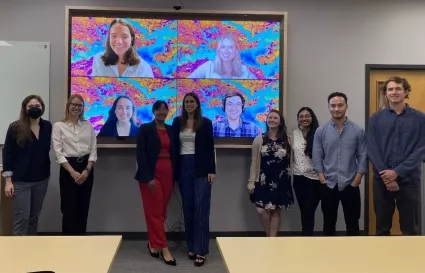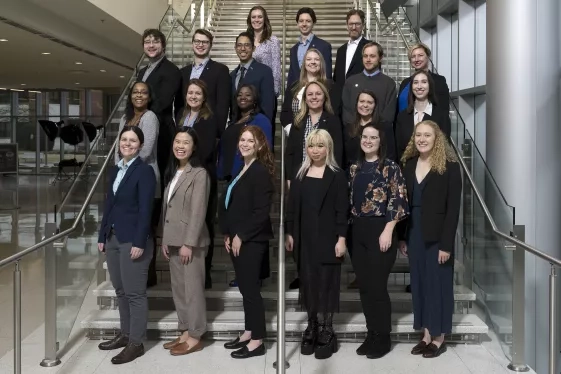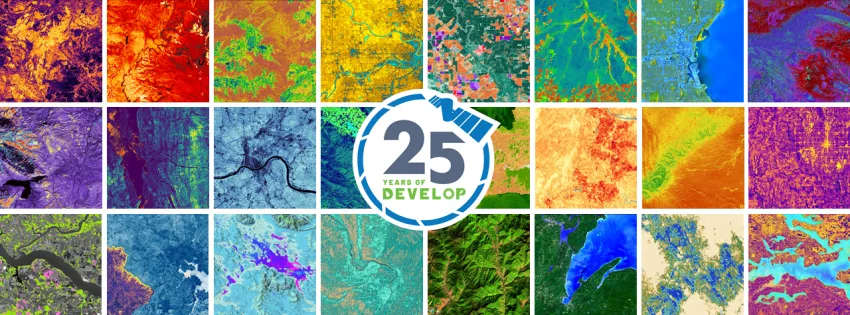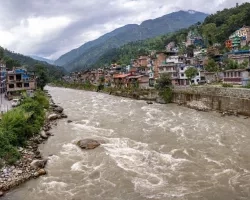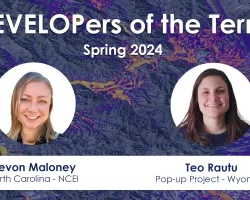NASA DEVELOP: 25 Years of Science Serving Society
For 25 years, the NASA DEVELOP Program has shaped strategic partnerships between communities and Earth observations, decision makers and data, and emerging Earth science professionals and capacity building. Since its inception in 1998, DEVELOP has provided 6,034 opportunities to participants working on 1,200 feasibility studies. With such a large impact over the past quarter century, DEVELOP has been a constant, yet it was not always this way.
DEVELOP began as a small idea. As Mike Ruiz, former program manager, was pondering ways to turn the taxpayer dollar into the best possible investment, he considered the growing use of satellite imagery in everyday life and the benefit to the workforce if they knew how to use it.
In 1998, after more consideration, some planning, and overcoming some metaphorical mountains, Ruiz put together a team of three interns—two undergrads and one high schooler—and gave them a multi-faceted mission. One part of this mission was to use available satellite data to search for Amelia Earhart’s plane. While Earhart’s plane was not discovered by the interns, their work culminated in the publication of The Practical Applications of Remote Sensing (Bauer et al., 1998). This paper proved not only the relevance of remote sensing, but the need for a program such as DEVELOP. The following year the DEVELOP Program was officially formed.
DEVELOP EXPANDS
Beginning in 2001, DEVELOP expanded beyond NASA Langley Research Center with locations changing throughout its 25 years. Today, the program hosts 10 permanent locations that include five NASA Centers and regional host locations at four universities and a NOAA facility, as well as varying "pop-up" locations each term. The COVID-19 pandemic led to a drastic shift within DEVELOP as the program suddenly transitioned to a fully remote, online setting. As DEVELOP adapted to the virtual environment, the program was able to offer opportunities to people who previously had not been able to participate due to the geographic locations and in-person requirement.
New opportunities also emerged in the structure of how the program operates, including the first program-wide, virtual Software Carpentry workshops. Before the pandemic, Software Carpentry workshops were only conducted in-person at select DEVELOP locations, so not all participants had the opportunity to go through the training. Now, DEVELOP offers virtual and hybrid coding trainings from certified instructors in Unix Shell, Git, Python, and R. There are also informal training opportunities in Google Earth Engine. Leaning into hybrid teaming, in the spring of 2022, DEVELOP opened two new offices: the Pop-Up Project (PUP) office, which coordinates short-term engagement of new host locations to expand the geographic reach of the program, and the Environmental Justice (EJ) office, which conducts projects that utilize satellite imagery integrated with socioeconomic data to understand the environmental injustices and disproportionate risk that many EJ communities face.
DEVELOP Evolves
DEVELOP’s leadership team experienced a significant change with Mike Ruiz’s retirement in December 2022, after serving as DEVELOP’s program manager for 24 years. Ruiz was often viewed as the ‘man behind the scenes.’ During his tenure, he mentored and guided thousands of participants and members of the leadership team, and he always made sure that they were the focus and at the forefront of any DEVELOP presentation. He strived to make the best use of taxpayers’ dollars and ensured that all project work was for the benefit of community end-users. As he reflected on one of his favorite parts about the DEVELOP Program, Ruiz described, “Everyone at DEVELOP works together to make a difference in the lives of others.” He started with a vision of how to combine early career professionals and remote sensing work, but he never imagined how the program would evolve over the last 25 years.
Dr. Kenton Ross, former DEVELOP chief scientist, became program manager in February 2023. When thinking about the future of the program, Ross said, “Our challenge now is to sustain Mike's vision for the program. As new NASA sensors are launched and technologies evolve, communities will continue to have urgent needs. DEVELOPers must continue collaborating to better enhance decision making and make a difference in the lives of others."
Alumni Impacts
With a broad network of DEVELOP alumni, the program has impacted the career paths of many of today’s emerging Earth science professionals. Participants join NASA DEVELOP as students, recent graduates, and early or transitioning career professionals, and the program often shapes participants’ careers by supporting them to cultivate skills that they carry into future roles. The program’s alumni network is very important because the value of DEVELOP is not just the success of their current term, but also their many future successes using the knowledge and skills that they learned while in the program.
“DEVELOP really influenced the place that I'm in now,” explained Dr. Chippie Kislik. She joined DEVELOP at NASA Ames Research Center as a participant in the spring of 2014. She then became an assistant center lead and communications fellow. After conducting research on harmful algal blooms through a DEVELOP project, Kislik began “thinking about water quality and how we can view that from space.” This interest took Kislik to Ecuador through a Fulbright scholarship to continue studying harmful algal blooms around the Galapagos. “From that,” Kislik described, “I applied to my PhD program at UC Berkeley and studied algal blooms across California using satellite imagery and drones.” Since earning her PhD, Kislik joined Planet Labs, where she performs technical assistance with customers and continues to examine water quality and water extent from space.
Across the multitude of experiences in NASA DEVELOP, many participants are most impacted by the relationships they cultivate during their time with the program. Kristen O’Shea was a participant and project lead across the 2018 spring, summer, and fall terms, as well as a center lead and geoinformatics fellow from spring 2019–fall 2020. O’Shea said, “Some of my best collaborations and friendships have come from this program, and the lessons I learned from my time as a team lead still guide me today…The DEVELOP community is great for exposing young/transitioning scientists to the proper ways of conducting remote sensing analyses, and I am happy that I was able to take full advantage of what the community had to offer.”
In a similar vein, Mark Baker, a participant from 2014–2015, campus ambassador in 2015, and communications fellow from 2015–2016 at NASA’s Jet Propulsion Laboratory, reflected that, “The main thing that I still think about today is all the relationships that I built and all the friends I made along the way to getting the projects done.”
Partner Impacts
NASA DEVELOP is a dual capacity building program, meaning that it not only impacts the participants who go through the program but also the partners who collaborate on the feasibility studies with teams to build their use of Earth science information. Through 1,200 projects, DEVELOP has engaged over 1,140 unique partnerships, which span federal, state, and non-profit sectors domestically and internationally. The program works closely with partners from the project development stage through project completion to align the project with the organizations’ needs that can benefit most from applying NASA Earth observations to enhance decision making.
Early on, DEVELOP initiated partnerships with numerous state and local government organizations, distinguishing itself from other programs at the time. As the program continued to expand partnerships to federal and non-profit sectors, DEVELOP has continued engagement with state and local government. A recent, multi-term project in 2022 with the City of Wichita, Public Works & Utilities focused on mapping urban heat to inform equitable and sustainable urban planning initiatives in Wichita, Kansas. Nina Rasmussen, Environmental Quality Specialist for the City of Wichita, describes how DEVELOP “has been an excellent way for our city to acquire more data, as our lack of equipment and staff knowledge on heat limited us. The team put together work that will help our decision makers more fully understand the risks of heat and what we might expect for our community in the future.”
A strong federal partner, and one of DEVELOP’s earliest partners, is the National Park Service (NPS). Since the first project, dating back to 2004, which studied carbon levels in the Fremont-Winema National Forest, more than 250 DEVELOPers have worked with over 40 NPS groups across 39 states. Through these 60+ projects, DEVELOP and NPS have explored a range of application areas from invasive species and coastline management to a series of urban development projects about light pollution and dark skies. Dr. Dan Stahler, a wildlife biologist at Yellowstone National Park, spoke to the impact of an ecological forecasting project in 2022, explaining that the team, who evaluated aspen extent and digitized historical aerial imagery from 1954, “provided a powerful baseline moving forward to ask a variety of questions about landscape level changes through time.”
DEVELOP also frequently collaborates with non-profit organizations, identifying new opportunities to apply remote sensing to support them and their communities in decision making. Groundwork USA is a national network of local trusts driven by environmental justice efforts and their work with communities to create healthy, green, and resilient spaces. Since the first Groundwork partnership in 2018, DEVELOP has conducted 15 projects with nine trusts. Over 60 participants have supported Groundwork by providing geospatial analyses and tools highlighting converging sociodemographic, socioeconomic, and environmental vulnerabilities. A summer 2021 project evaluating landslide and flood susceptibility in the Greater Cincinnati area “helped [Groundwork Ohio River Valley] translate the analysis to frontline communities facing high climate vulnerability,” said GIS and spatial data analyst Sara Morgan.
DEVELOPing the Future
The changes and improvements over the years, is primarily based on feedback received from DEVELOPers as they exit the program. DEVELOP has truly been built “standing on the shoulders of giants,” with the lessons learned, challenges, and ideas from prior terms being input for upcoming terms. During the collection of feedback, DEVELOP alumni give advice for incoming participants and what they think about DEVELOP in the future.
Dr. Amanda West Fordham was a participant, project lead, and center lead at the Colorado – Fort Collins node between 2014–2015. She challenges participants “not only to ask as many questions as is necessary during your project, but also to wisely listen to others. As society rapidly adapts with advances in technology including artificial intelligence, there are human elements that will continue to increase in importance. These include asking meaningful questions, incorporating human experience, and team building.”
Ryan Theurer was a team lead at the Langley Research Center node in summer 2018. He recently returned to NASA DEVELOP as an advisor for the spring 2023 term, explained, “Right now is a very exciting time to be working in ... applied Earth sciences. As the amount and quality of our data improves, ...we are going to be able to provide better and better solutions to our environmental problems. These advancements are going to require scores of more specially trained individuals... I believe that DEVELOP is one of the few leading programs that focuses on this inspiring field of work and is actively training the future leaders in it. I’m confident that DEVELOP will continue to lead the way in this field for years to come.”
As DEVELOP evolves in the future, one thing is certain: DEVELOP will continue to change the future of applied Earth Science one participant and one organization at a time.
